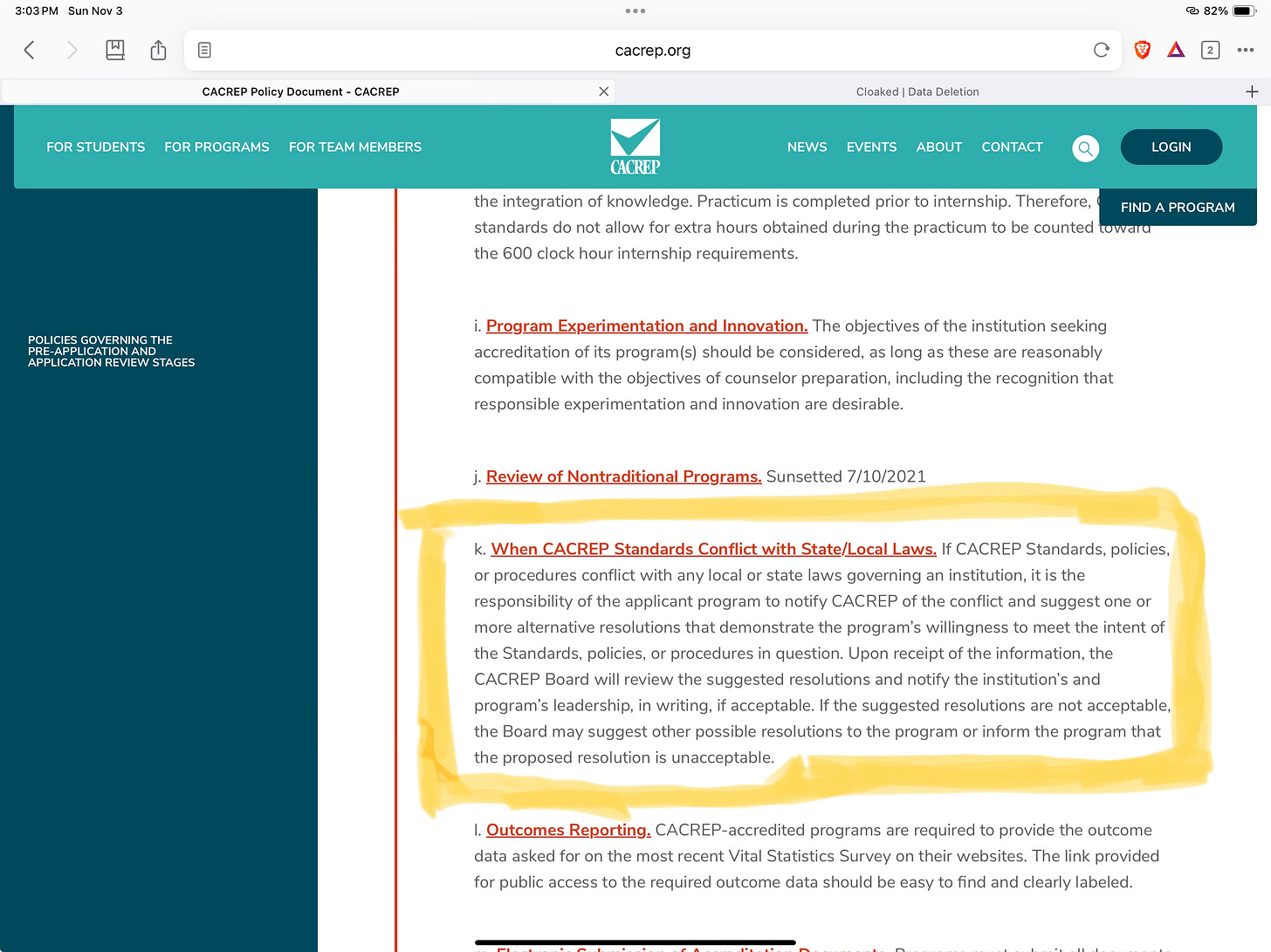
Editor’s Note: The following is an excerpt of an article originally published on the author’s Substack Diogenes In Exile on December 2, 2024. With edits to fit MTC’s style, it is crossposted here with permission.
Under what circumstance would it be acceptable for accreditors to knowingly require a standard that flouts state law? The idea is worth consideration because that is exactly what the Council for Accreditation of Counseling and Related Educational Programs (CACREP) is doing. And I’m willing to bet they are not the only ones.
The evidence that CACREP knows its standard breaks state law is openly available (pdf version) on their website (HTML), at least right now. It is in their policy statement to educators on how they should be managing their end of upholding the standard. In case it disappears there, you can see it here in this screenshot:

[RELATED: Florida Leads Fight Against Politicized Accreditation]
This is the full text:
When CACREP Standards Conflict with State/Local Laws. If CACREP Standards, policies, or procedures conflict with any local or state laws governing an institution, it is the responsibility of the counselor education program to notify CACREP of the conflict and suggest one or more alternative resolutions that demonstrate the counselor education program’s willingness to meet the intent of the Standards, policies, or procedures in question.
Notice how their priority is that the universities “demonstrate the counselor education program’s willingness to meet the intent of the Standards.” So what they are effectively saying is, “Yeah, we know this might be illegal in your state, but we want you to prove to us that you want to meet it anyway.”
Tennessee (and other) State Law
You might be wondering what could possibly make an educational standard illegal. The answer is indoctrination and demanding belief. In Tennessee, the state focused specifically on what they called “Divisive concept(s).” To be explicit, they don’t want educators to teach racism and bigotry. That was made into law with House Bill No. 2290, which states:
The general assembly finds that the divisive concepts described in Section 3 of this act exacerbate and inflame divisions on the basis of sex, race, ethnicity, religion, color, national origin, and other criteria in ways contrary to the unity of the United States of America and the well-being of this state and its citizens.
They were very clear about what they didn’t want, as you can see:
“Divisive concept” means a concept that:
(A) One ( 1) race or sex is inherently superior or inferior to another race or sex;
(B) An individual, by virtue of the individual’s race or sex, is inherently privileged, racist, sexist, or oppressive, whether consciously or subconsciously;
(C) An individual should be discriminated against or receive adverse treatment because of the individual’s race or sex;
(D) An individual’s moral character is determined by the individual’s race or sex;
(E) An individual, by virtue of the individual’s race or sex, bears responsibility for actions committed in the past by other members of the same race or sex;
(F) An individual should feel discomfort, guilt, anguish, or another form of psychological distress solely because of the individual’s race or sex;
(G) A meritocracy is inherently racist or sexist, or designed by a particular race or sex to oppress another race or sex;
(H) This state or the United States is fundamentally or irredeemably racist or sexist;
(I) Promotes or advocates the violent overthrow of the United States government;
(J) Promotes division between, or resentment of, a race, sex, religion, creed, nonviolent political affiliation, social class, or class of people;
(K) Ascribes character traits, values, moral or ethical codes, privileges, or beliefs to a race or sex, or to an individual because of the individual’s race or sex;
(L) The rule of law does not exist, but instead is a series of power relationships and struggles among racial or other groups;
(M) All Americans are not created equal and are not endowed by their Creator with certain unalienable rights, including, life, liberty, and the pursuit of happiness;
(N) Governments should deny to any person within the government’s jurisdiction the equal protection of the law;
(0) Includes race or sex stereotyping; or
(P) Includes race or sex scapegoating;
The law goes on to detail what the legislators mean by “race or sex scapegoating” and “race or sex stereotyping,” but you get the gist.
[RELATED: Is Accreditation a Scam? The System Fueling Ideology in Higher Ed]
According to Education Week, Alabama, Arkansas, Florida, Georgia, Idaho, Iowa, Kentucky, Mississippi, Montana, New Hampshire, North Dakota, Louisiana, Oklahoma, South Carolina, South Dakota, Texas, Utah and Virginia all have similar laws.
Education Week also goes on to state:
Since January 2021, 44 states have introduced bills or taken other steps that would restrict teaching critical race theory or limit how teachers can discuss racism and sexism, according to an Education Week analysis. Eighteen states are imposing these bans and restrictions either through legislation or other avenues.
You can see the complaint that these laws “would restrict … or limit how teachers can discuss racism and sexism. Hmmmm. Yes. Well, we will take a gander at what that looks like shortly.
But first, let’s examine CACREP’s accreditation standard and why they already know it “conflicts” with state law.
Read the full article here and follow Suzannah Alexander on X.
Image: Tennessee State Capitol by Ichabod on Wikimedia Commons